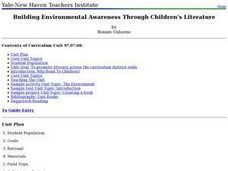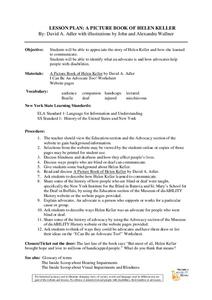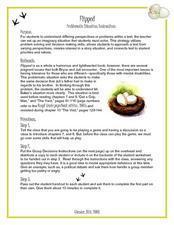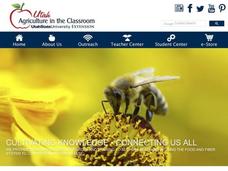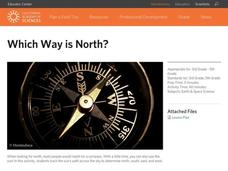University of Oklahoma
Improving My Communication Skills
The two lessons in the fifth unit in this series are designed to help students with disabilities improve their communication skills. The first lesson has class members practice strategies and skills for appropriate communication. They...
Curated OER
Advocates for Disabilities
Students research people who have contributed to making life better for the disabled. In this advocacy instructional activity students enter the names of advocates on cards and divide into groups. Students complete a worksheet based on...
Museum of Disability
Don't Call Me Special
Introduce young learners to the idea of disabilities and making friends with children who are different than they are. Using Don't Call Me Special - A First Look at Disability by Pat Thomas, learners are guided through the new vocabulary...
Curated OER
Dyspraxia Presentation
Not really a resource for use in the classroom - this file is a PowerPoint presentation which gives information about Dyspraxia. It is a very interesting presentation because it shares many signs to look for in a person who may be...
Curated OER
Human Rights
Students read the Universal Declaration of Human Rights and then research countries which have had human right violations.
Curated OER
Environmental Awareness and Children's Literature
Use an alternative setting for pregnant teens and young mothers, as well as special education children to examine environmental topics through literature. Included in this unit is a visit to neighborhood libraries to select children's...
Curated OER
Weight Training: Lifetime Fitness
Students research the relationship between physical activity and the prevention of illness, disease and premature death. Students understand that working out regularly will increase muscular strength, endurance and improve many areas of...
Curated OER
Earth's Water: A drop in your cup
Students complete activities where they observe the amount of freshwater in the world as a fraction of the actual amount of water using different mixtures. For this freshwater lesson plan, students brainstorm on how to preserve freshwater.
Curated OER
A Picture Book of Helen Keller
Students advocate for people with disabilities. In this Helen Keller lesson, students listen to the story A Picture Book of Helen Keller by David A Adler. Students discuss how Helen Keller learned to communicate and became an advocate...
Curated OER
Trading Cards
Learners create trading cards based on historical individuals that helped people with disabilities. In this disabilities lesson plan, students put the name, picture, description, and graphic on the card.
Curated OER
"Cures" Chart
Students chart the "cures" for people with disabilities. In this disabilities instructional activity, students compare and contrast the care and treatment of people with disabilities in the past and present. Students write accurate...
Brigham Young University
Flipped: Problematic Situations
An activity based on the young adult novel Flipped, groups work to make the same difficult decision a character in the novel faces. Each group is given the same scenario about caring for a mentally disabled brother personally or putting...
Curated OER
Microbe Experimentation
Sixth graders formulate a question about microorganisms that can be answered with an experiment. They develop a hypothesis for a questin about microorganisms based on observations and prior knowledge. Pupils carry out an investigation on...
Curated OER
Build a Coral Polyp
Students build a coral polyp out of a banana, straw, oyster crackers, sprinkles, and more. In this coral polyp lesson plan, students also list the differences between plants and animals.
Curated OER
Ruminating on the Digestive System
Students compare the digestive systems of the buffalo and of the zebra, diagram their systems, and compare their lengths. In this digestive system lesson plan, students learn about their diets as well.
Curated OER
Sensational Seaweed
Learners compare kelp and land plants. In this sea plant lesson plan, students look at the role of algae in aquatic environments. They research the properties of kelp and explore seaweed.
Curated OER
Cures: Barometer
Young scholars discuss and fill out a worksheet about the controversial cures of people with disabilities in the past. In this disabilities lesson plan, students write about the issues and justification for if they agree or disagree with...
Curated OER
Apple of My Eye
Students study apples. In this apple lesson, students read Apples by Gail Gibbons. Students discover the life cycle of apples and determine the many uses of apples. Students write a list of factual information on strips of construction...
Curated OER
Bartering in Jamestown
Students explore bartering. In this bartering lesson, students study everyday life in the Jamestown colony. Students discover how bartering was used as a way to acquire necessary supplies.
Curated OER
Biodegradable Plastics
Sixth graders explore the many uses of corn as a renewable source. In this biodegradable resource lesson, 6th graders investigate how corn is used in manufacturing and as a fuel. Students construct a piece of homemade plastic using...
Curated OER
Exploitation, Day 2: Exploitation and Getting Help
Exploitation is a real issue for the disabled community. Secondary Special Education students learn what exploitation is, their personal rights, and how to say no. They focus on finding a trusted adult to get help if they have been taken...
Perkins School for the Blind
Circle Time
Oftentimes children or teens with one or more disability are reluctant to participate in whole-group activities. Foster good participation, verbal expression, and social skills through daily circle time activities. Each day you and your...
California Academy of Science
Which Way is North?
Who needs a compass to find cardinal directions? Just place a stick in the ground and record the movement of its shadow over the course of a day. Then, measure the shadow lengths in order to determine a north-south line. A simple...
Curated OER
STD & HIV/AIDS, Day 2: HIV/AIDS - Staying Safe
Decrease risky behavior and inform your secondary Special Ed class about AIDS/HIV. They talk about germs, AIDS, transmission, and staying safe. Developmentally disabled individuals need to be informed about safe sex and disease...
Other popular searches
- Disabled Students Art
- Disabled Students Health
- Visual Disabled Students
- Art for Disabled Students
- Disabled Students Music
- Disabled Students Art Paint
- Visual Disabled Students p.e
- Disabled Students Drama
- Visual Disabled Students Pe
- Disabled Students Calenders







